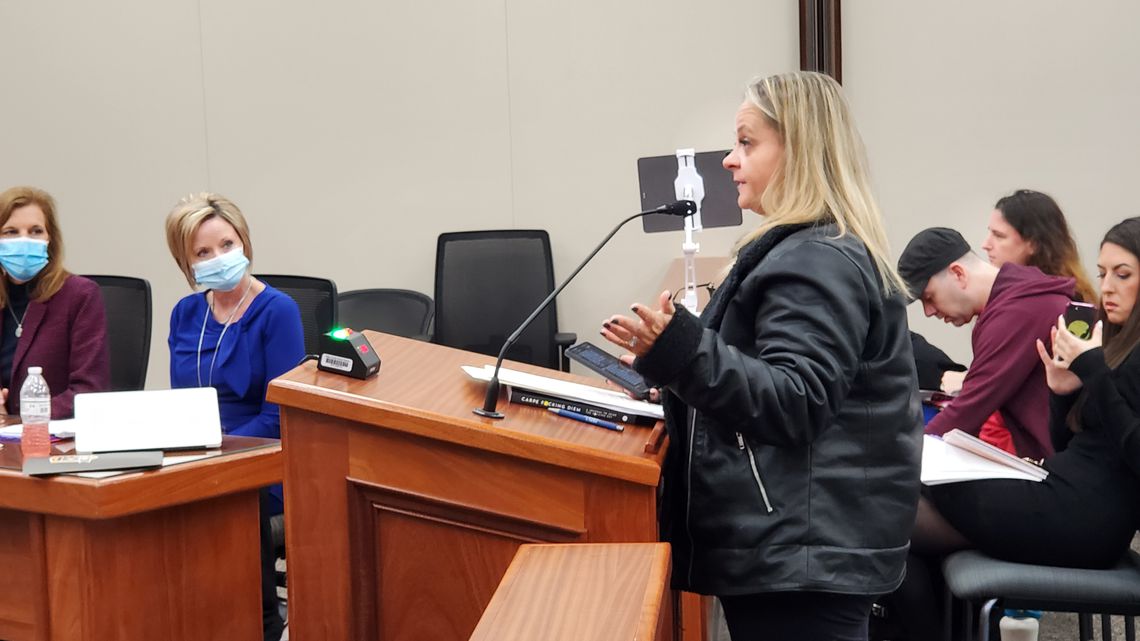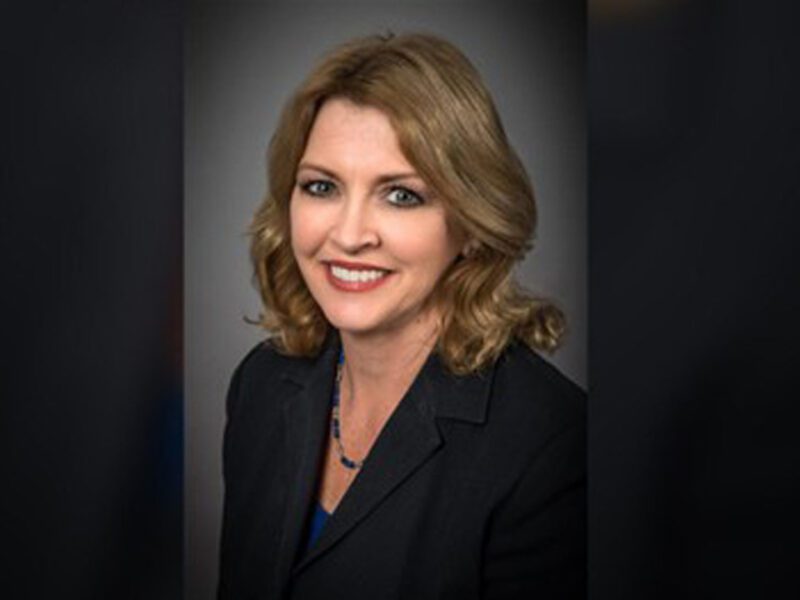
Florida’s new parental rights law tests limits, and patience, in Pasco
School officials say a parent’s demands caused disruption. Rebecca Yuengling says she was just standing up for her child.
Tampa Bay Times | By Jeffrey S. Solochek | February 8, 2022
WESLEY CHAPEL — It all started with a classroom survey on personal pronouns.
On the first day of school in August, Pasco County parent Rebecca Yuengling got a message from her daughter that some of her teachers at Cypress Creek High had asked students what name and pronouns they preferred. They also asked if it was OK to share that information with the teens’ parents.
Yuengling contacted teachers and administrators to insist that the questioning stop. She claimed it could lead to sexual abuse and invoked the Parents’ Bill of Rights law, approved by the state Legislature in 2021. She told the school administration she didn’t want certain teachers meeting alone with her child, because she didn’t trust them.
It became the first of many complaints Yuengling would level against the school during the semester.
With each one, tensions escalated to the point that three teachers asked the courts to protect them from Yuengling. One left her job. The superintendent stepped in with an unprecedented intervention.
For all involved, it was a real-time test of Florida’s new law.
District officials responded to Yuengling’s initial demand within days. They said the survey was not part of the curriculum, was not required, and it had ended. They stressed that no teachers were attempting to establish an inappropriate relationship, thanked Yuengling for bringing the issue forward, and said that, from their perspective, the matter was handled.
“As stated by (principal Carin) Hetzler-Nettles this morning, please feel free to reach out to her directly in the future,” assistant superintendent Monica Ilse wrote in an email to Yuengling.

Over the next four months, Yuengling did so. Repeatedly. She also expanded her list of complaints to include issues such as “safe space” rainbow stickers on classrooms and the intrusion of “critical race theory” into the schools, making regular trips to the School Board to express her views.
“I’m advocating for my daughter,” Yuengling said in an interview. “As a parent, you want to have a voice for your child.”
School and district officials saw it differently.
They claimed she was harassing the faculty and staff, and disrupting the operations of the 1,700-student high school. So much so that superintendent Kurt Browning unilaterally reassigned Yuengling’s daughter out of Cypress Creek High as the second semester began.
“It’s gotten so bad, it’s gotten so problematic, you have to do something to get things settled back down at the school,” Browning said in an interview.
His decision, which came with bus service for the student but no room for an appeal, sparked a backlash among some residents who wanted to know how the superintendent could punish a child because of her parent’s actions. It highlighted the ongoing national battle over how much individual rights may override the objectives of the larger group, in this case the public school.
Doing the ‘right thing’
For months, Gov. Ron DeSantis and many Republican lawmakers have told parents their rights are paramount in Florida’s schools. The state, DeSantis said in October, must find even more ways to “empower parents’ rights to decide what is best for their children.”
They enshrined the idea with the new law asserting that parents have full charge of their children’s education without obstruction or interference from government, including public schools.
And ever since, theconcept has played out in often-heated debates over coronavirus masking and vaccination, library book availability, race lessons in history classes, and restroom rules involving transgender students.
Citing these rights, growing numbers of parents have started to make demands of their schools based on what they think is best for their own children.
As Yuengling put it, “Just do the right thing. That’s all I want.”
But schools have found that parents frequently disagree on what the right thing is. Educators are often left to make decisions that have someone feeling ignored. And that can fan the flames of discontent.
Pasco superintendent Browning suggested that some parents, emboldened by the support of state officials, don’t always think through how their actions affect the greater public good — a concept taught in the civics standards that the governor and others often celebrate.
“The Legislature has said we’re going to let parents decide how kids are educated. That’s fine,” Browning said. “But it has certainly amped up the negative consequences of that decision…. People are taking great liberties with that law.”
Enough was enough
In a Jan. 21 letter to the Yuengling family, Browning explained why he was sending their daughter to another school, and not allowing their eighth-grader to attend Cypress Creek High next fall. He cited the mother’s “evident” dissatisfaction with the school, and her way of expressing it.
“Your voluminous emails (in excess of 500 pages), phone calls, public statements and posts on social media are not only harassing in nature to administration and staff, but also disruptive to the learning environment for our students,” he wrote.
At a Dec. 14 meeting, deputy superintendent Ray Gadd called the School Board’s attention to one email that had particularly upset the Cypress Creek staff. Yuengling had accused the principal of harboring pedophiles and supporting activities that lead to pedophilia, Gadd said, and she threatened to seek charges against any staff member involved in exploiting children.
“I don’t know if you call it racism. I don’t know if you call it mean-spiritedness. But it’s inappropriate and it violates my core beliefs,” Gadd told the board, speaking in defense of the principal and staff.
In a separate November email, Yuengling demanded a teacher remove a rainbow flag from her classroom, again invoking the state’s parental rights law.
“See I believe there are only 2 genders, and it’s my fundamental right,” she wrote. “I’m also Christian, and the whole LGBTQ promotion is encouraging my child to sin. Take down the flag and leave your politics at home…. I don’t want (name redacted) to have any further pedophile promotion or propaganda from you.”

Browning stated in his letter that three teachers sought court injunctions against Yuengling — none were successful, and no court records were publicly available. One of the teachers ultimately took an early retirement.
That teacher, Linda Kropik, said in an interview that she could not tolerate Yuengling’s regular “nastygrams.” She said the notes, which came every 2½ weeks, berated the veteran educator for not knowing the law or her subject matter, and also included allegations that her daughter was afraid of Kropik.
Those led to three mandatory investigations into the teacher’s behavior, Kropik said. They turned up nothing.
“I enjoy teaching and helping children learn, but the continuous harassment (cyber bullying) from this parent, I was not willing to deal with,” Kropik wrote in an email to Hetzler-Nettles. “No teacher should have to put up with this type of parent. Parents should have rights, but so should the teacher.”
Enough was enough for Browning, who decided to move the Yuenglings out of Cypress Creek High.He cited the district’s decade-old policy on student assignment, which authorizes thesuperintendent to change students’ schools based on several criteria, including the welfare of other students or staff. Neighboring districts have similar policies.
Just speaking out
Yuengling foundthe district’s treatment of her daughter unwarranted. She said the girl is respectful and polite, gets along well in school with her friends and most teachers.
Removing her from a school because of her mom’s actions was unfair, Yuengling argued — especially without any room for an appeal. While her emails might have been emotional at times, she added, she did not threaten to harm anyone or disrupt the school.
Yuengling had grown frustrated that when she asked to meet with the superintendent, he did not respond. She said she wanted to make clear her concern as a former victim of sexual abuse that things like the pronouns survey could become a gateway to bad acts.
Any time an adult asks such personal questions, and suggests that the answers can be kept private, that should be a red flag, Yuengling claimed. Child predators don’t look any specific way, she added, mentioning a variety of local cases where school employees had been arrested for bad acts with children.
“I made a promise to myself,” she said. “As an adult, I would never be silent for kids.”
Yet she felt unheard by the superintendent, principal and teachers.
“If an email is disrupting the campus, an email that there’s no threat of harm, I just don’t understand,” she said.
Browning said he did not warn the family of his decision ahead of time, and did not offer to reconsider. District policy doesn’t require him to do so, he said.
“It doesn’t make any sense, other than to just shut parents up,” said Yuengling, who has begun organizing with conservative groups in the area.
Supporters stepped up on her behalf at the School Board’s Feb. 1 meeting.
Erin Pike was among those calling for a review of the policy, which she suggested gives the superintendent a blank check to impose his will without any due process. Even students accused of egregious acts are granted an appeal before they are reassigned, Natalie Kronin added.
“He’s not a king. We don’t live in a kingdom,” Pike told the board.
Another resident started an online petition that states, “this could be your child if you chose to speak out. Your child is punished for your sins.”
Board members declined to talk about the situation, though vice chairperson Megan Harding asked for a future workshop to review the policy.
Browning emailed the Yuenglings on Jan. 24 to set up a meeting where he could explain “the events that led to this decision being made.” The next day, the family filed a request for an injunction to the move in county court.
Two weeks later, Rebecca Yuengling’s husband, Richard, notified School Board attorney Dennis Alfonso of the family’s plan to dismiss the civil action, saying he did not want to disrupt his daughter’s education any further.
Rebecca Yuengling said she believed if a parent is problematic, the school should deal with the parent and put the student’s best interest first.
Browning countered that Yuengling has the right to express herself to the administration and School Board. But when it comes to the orderly operation of a school, he said, a parent cannot disrupt the learning environment without consequences.
“I had teachers leaving, feeling threatened and harassed, all because of one parent,” Browning said in an interview. “It’s not happening on my watch.”
The big question
Is this what state leaders had in mind when they advanced their parental rights agenda?
A spokesperson for the Governor’s Office said Florida has laws in place to deal with harassment, if schools need to use those.

“Parents attending school board meetings, submitting public records requests, and communicating with their children’s school is not ‘harassment’ and should not be construed as such,” spokesperson Christina Pushaw said via email.
At the same time, she said, the Governor’s Office could not offer any legal analysis or conclusions on the Pasco situation. She referred to the new law to explain how far parental rights extend in the schools.
The law reserves many rights for parents in directing their children’s education. At the same time, it states that it does not prohibit “employees of a government agency that is responsible for child welfare from acting in his or her official capacity within the reasonable and prudent scope of his or her authority.”
Jared Ochs, spokesperson for the Florida Department of Education, stood behind Pushaw’s comment. He said the department had heard from Pasco residents about the incident, and was not intervening.
“That being said, we are more than willing to assist the district and the parent as they work through their differences and find a solution that is in the best interest of the child,” Ochs said.





